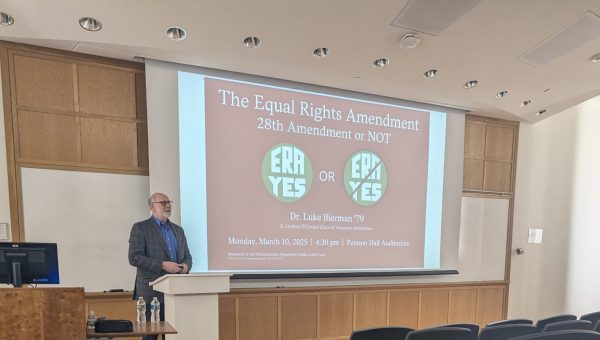Admiral Jim Stavridis Addresses Global Security in the 21st Century
On Wednesday, February 25, in Love Auditorium, the International Relations Council sponsored a lecture by NATO Commander Admiral Jim Stavridis titled “21st Century Security: Challenges and Opportunities.” Stavridis served in the United States Navy, beginning in 1976 upon his graduation from the U.S. Naval Academy. In 2009, he became the Supreme Allied Commander of NATO, a title he maintained until 2013. Now the Admiral is the Dean of the Fletcher School at Tufts University.
Stavridis started his presentation with a photograph of the Class of the 1914 French military academy graduates, all of whom were killed in World War I by 1918. The Admiral used this introduction to launch his message: walls cannot create security. Both World Wars were fought with the mindset that walls created security. Instead, the Admiral promoted building bridges with other countries as a means to maintain security.
Following his lecture theme, the Admiral next discussed threats to international security. He used examples of terrorism all around the world as security threats and then cited the Islamic State as the most dangerous threat to 21st century security. According to the Admiral, their funding, international brand and planning put them above all other terrorist threats. Other threats to security that he cited included North Korea, Russia in Ukraine, Syria, drug trafficking, ebola and cyber attacks. However, Stavridis named poverty and inequality as the two greatest challenges, contributing to all of these different threats in some way. In order to overcome those challenges, the Admiral claimed the United States certainly has a role to play in creating positive outcomes.
“We cannot and should not be the world’s policemen, but we should be leaders,” Stavridis said.
In order to build bridges, the Admiral thought the United States military should enhance cyber capabilities and special forces and create unmanned stations in space. He preached “higher quality and lower quantity” for military investment. With these changes, the United States could build bridges through what the Admiral called “soft power.” Soft power, like hospital ships and literacy training, could lead to better partnerships and international advancements. By taking advantage of these opportunities and others, like safe hydrofracking, becoming partners with India and the world of biological technology, bridges can be built to enhance
national and international security.
Students who attended the event responded positively to Stavridis’ lecture.
“He was definitely one of the best informed speakers I’ve ever seen at Colgate. I think the way that he presented just about every issue that faces the world today was very well done, because he discussed them in the most apolitical terms possible, merely stating facts and relevant information,” senior Brandon Zaccardo said.
“I thought Admiral Stavirdis’ talk was extremely educational. He did an excellent job at highlighting all the pressing security issues of the 21st century, and he provided concrete steps to address them through diplomacy and bridges instead of through threats and strong-arming,” sophomore Michael Hogg said.
“The most interesting point he made was bringing Western ideas like freedom and equality to social media to better deliver them to the next generation. Enemies of freedom currently do a better job at marketing their message. I thought it was great how he encouraged everyone to read fiction novels as a way to learn more about themselves and the world. Through that sort of discovery, people can get a better grasp on how to handle real-world issues.”





